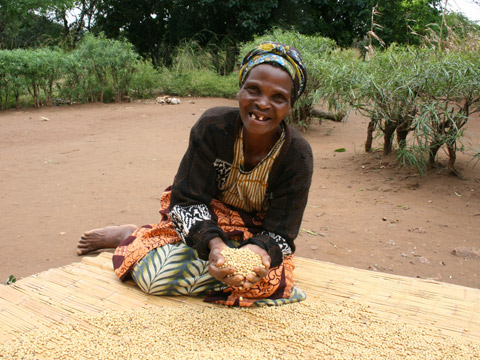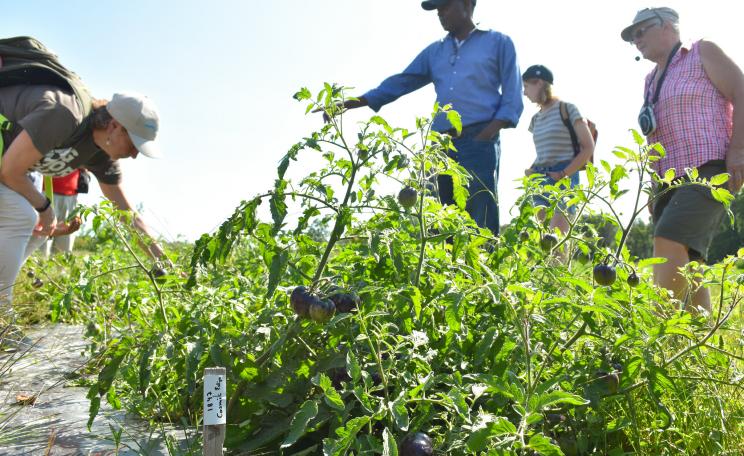At the start of 2012 we should be energised by the news that BASF, the German chemical and seeds giant, has decided to pull out of genetically modified plant development in Europe. This is testament to the effectiveness of public pressure and 'another nail in the coffin for genetically modified foods in Europe,' as Adrian Bebb of Friends of the Earth said.
But beyond successes in GM skirmishes, we should remind ourselves why we should be optimistic about the defence of the food system which feeds most people in the world, and thus be clearer about the research policies and practices needed to enhance it.
• The dominant food systems in the world are local, small-scale and organic food webs, not giant supermarkets chained to industrial commodity production that is destroying livelihoods, local markets and the environment. 70 per cent of the global population eats local food grown and harvested mainly by small-scale farmers, gardeners, livestock keepers and artisanal fishers – and they do this mostly without recourse to proprietary chemicals and seeds.
• There is a rising tide of support, backed by the International Agriculture Assessment (IAASTD), for more ecological, environmentally-friendly and health-enhancing approaches to food production that will enhance agricultural biodiversity, soils, water and climate. It’s matched by an equally strong rejection of corporate control over, and speculation in, food, production and landgrabs.
• European and international debates on the food system are raising awareness and increasing pressure for political accountability in: changing Europe’s CAP (Common Agriculture Policy); enforcing global environmental governance at Rio+20 and the climate change and biodiversity conventions; defining a Global Strategic Framework for securing future food by the renewed UN Committee for World Food Security; and resetting priorities for global agricultural research at GCARD 2012 (Global Conference on Agricultural Research for Development).
• The International Peasant Farmers’ Movement, La Vía Campesina, and related social movements, which represent the views of the world’s small-scale food providers, have a well-developed policy framework, Food Sovereignty. This would secure future food if their production systems can be supported and protected and if they are decisively involved in setting priorities for resource use, investment, markets and agricultural research, development and production.
They know what needs doing and how to do it.
Yet, it seems the research establishment, in hock to Big Agriculture, is blind to these needs and opportunities. The Financial Times reporting on the BASF decision to relocate its GM research to the USA quoted a senior researcher in biosciences, Professor Jonathan Jones from the Sainsbury Lab in Norwich as saying: 'The psychological damage is that it will tell the next young people who might want to go into plant science that they can’t bring anything exciting to market… and it also discourages government support if [GM technology] is not going to be deployed in Europe.'
He may be correct with his second point if UK government priorities are still wedded to promoting GM technologies – perhaps some neo-colonial dream in which the UK fixes a new world order that will secure commodity supplies from other countries using their cheaper labour and our (proprietary) technologies and knowledge.
But ‘psychological damage of young people’? Isn’t this more likely to be the result of the ‘cognitive dissonance’ caused by such an extreme mis-match between what is needed to feed the world and what they are being asked to do by Big Science?
Today, there can be no greater scientific challenge in the food system than how to shift it towards a more ecological and healthier form of production and consumption that can be controlled locally. These systems are more productive per area of land or drop of water – and more sustainable, carbon neutral, biodiverse, resilient and locally determined – than industrial commodity production. Science should embrace the challenge.
A new generation of agricultural scientists could be encouraged, building on the example of many pioneers, to work with knowledgeable small-scale food providers to enable that shift to take place. Using improved tools for analysing biological, economic, legal and social systems they could enrich understanding, enhance local knowledge and practice and strengthen local communities’ and social movements’ control over the use of their common resources for securing localised food systems.
Big Agriculture and Big Science won’t like this – it won’t enrich corporate coffers – but the majority will.
We should build on the energy generated by the food sovereignty movement that calls for public support and better governance to transform the food system.
Now, as the sun shines, it’s time to turn the hay, to keep up the momentum and to gather enthusiastic young people into democratically controlled agricultural research, development and production systems fit to realise food sovereignty.
Patrick Mulvany is a senior policy adviser to the charity Practical Action and also chair of The UK Food Group
| READ MORE... | |
 |
NEWS ANALYSIS Agroecological farming 'can double food production in Africa over next 10 years' Low-input farming projects, not reliant on chemical fertilisers and pesticides, have brought significant increases in food production in Africa, south-east Asia and South America |
 |
NEWS ANALYSIS Public sector should develop GM crops for seed companies, says leading researcher We speak to research leader and plant geneticist Professor Jonathan Jones about why he is in favour of an expansion in GM crops |
 |
NEWS Agroecological farming methods being ignored, says UN expert Success of agroecology in Brazil, Cuba and Africa should be replicated in place of current support for intensive farming techniques |
 |
NEWS Worldwatch report attacks criminalising of seed saving and promotes agroecology Green revolution approach of expensive fertilisers and seeds is failing and needs replacing with projects that prevent food waste, build resilience to climate change, and strengthen city farming |
 |
COMMENT Africa doesn't need a green revolution. It needs agroecology Green Revolution architect Norman Borlaug is credited with 'feeding India'. But the feat took more than hybrid varieties and fertiliser, and it will take a much more sophisticated approach to help Africa feed itself |





